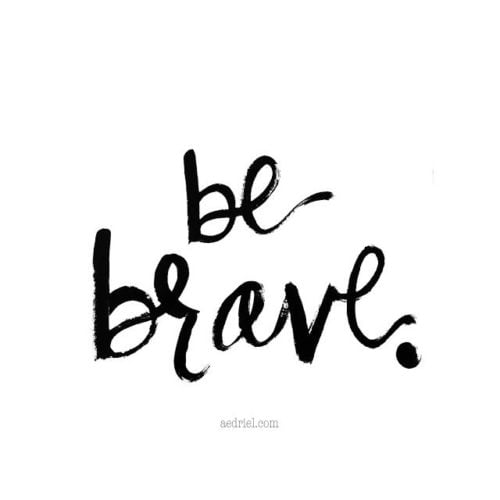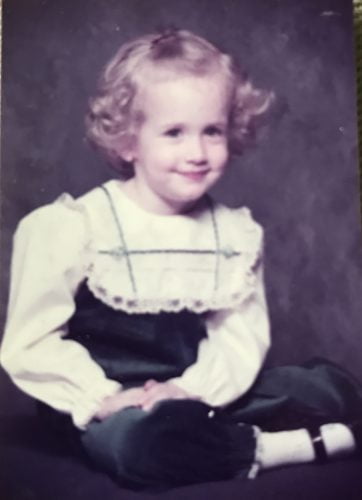 I am a cradle Christian.
I am a cradle Christian.
My name was on the Sunday School roll in the church nursery before I was born.
The stories of scriptures and words of the Bible have always been readily accessible to me when I was just a toddler (as seen in this picture).
I could recite the books of the Bible by the time I was 7 and could name the fruits of the spirit from the book of Galatians by age 9. The Christian school my parents sent me to in junior high challenged me to read the Bible through in the 7th grade (and I did!). I had a working knowledge of church history high school. I really don't know another way, for good or the bad.
But, the older I get, I realize, my story is an anomaly.
We don't teach our kids Bible stories, Bible facts or even stories of faith like I was taught in the height of Southern Baptist evangelicalism of the 1990s. As stiff structure surrounding the institutional church dies, fewer and fewer kids are growing up as I did including my own daughter.
Instead, the folks that fill the church pews of the congregations I'm most drawn to pastor aren't people who would call themselves cradle Christians. Or if they do, they'd say they are "recovering from it." I also hear a lot of "I'm a Christian but not that kind . . . "
Maybe cradle Christians are a dying bred?
If this is true, then how then do people arrive at faith, then, if not by osmosis from childhood? Isn't that how most people chose a religious tradition?
Recently, while I attended Wild Goose Festival in Hot Spring, NC I had the opportunity to meet a fellow author with a story that answers such a question. Kate Rademacher is a recent convert to Christianity is the author of a new memoir called, Following the Red Bird: First Steps into a Life of Faith.
In her book, she describes how after years of living in a social conscious, yet secular home and marrying a practicing Buddhist husband, she finds herself hearing the voice of God for the first time.
Though her childhood idea of the Trinity was "reduce, reuse and recycle" she found herself saying "Hello" (literally just like that) to God. The conversation took off from there (how amazing!). Within months, Kate found herself on a Christian path learning more about Jesus then seeking baptism in the Episcopal Church several years later.
Kate's prose was refreshingly honest and engaging. You never feel like Kate is telling you what you want to hear but what actually is her experience of God. Once I started reading Following the Red bird, I couldn't put it down. I finished it the next day.
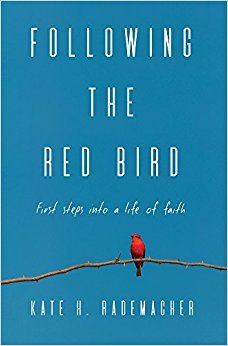 When I got to the last page, I felt grateful for the way that Kate calls out cradle Christians like me for our privilege (even if that was not the main focus of her story).
When I got to the last page, I felt grateful for the way that Kate calls out cradle Christians like me for our privilege (even if that was not the main focus of her story).
Seeing the world through Kate's lens, we, cradle Christians, have no idea how scary it is to walk into a study group with no working knowledge on the Bible.
We have no idea what it feels like to be drawn to a life of prayer without what to say.
We have no idea how discernment feels like without any spiritual tools to know if you're a helpful track or not.
So, as a pastor, I'm so thankful to have Kate's story as a resource for spiritual seekers who find their way to my inbox or office.
But even more than this, I'm grateful for how Following the Red Bird opened up my spiritual imagination.
We, as cradle Christians or even as professional ministers, can get so stressed out on God's behalf (or so we say).
We invest in lives, hoping for spiritual growth, but nothing changes. We preach our hearts out and it feels like no one is listening. We expect a particular trajectory for the spiritual formation of our children or grandchildren. And we feel sad when it doesn't happen.
I even saw that with the baptism of my daughter several months ago. Several well wishers remarked on social media that they wish she grows up to be a "God-fearing woman who takes to the teachings of the faith early." While I know it came from a loving place, my first reaction was "What pressure! Don't put that on her."
Here's the thing I believe about spiritual journeys (which Kate's story helped to me to see all over again): we can't control them.
The best conditions for spiritual instruction can't make a person find a personal conviction. Nor can lack of religious education keep a person from God when it's the right time for the journey to begin.
Openness is really the best gift we can give each other, especially to our children.
Isn't that what faith is about in the first place? Letting go and trusting in a power beyond what we can see?
I'm glad, as a cradle Christian, for the gift that Kate's faith story is to the world.
(Check out Kate's book on Amazon if you're looking for a faith memoir!)
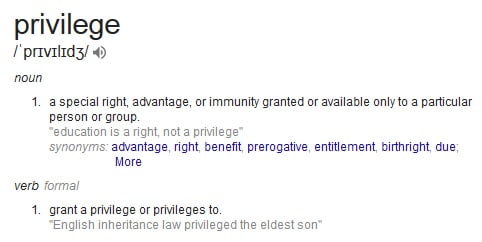 Do you think of yourself as a person of privilege?
Do you think of yourself as a person of privilege?
This is this third in the series of "How do we live in these days?" If you missed last week's post:"Why is my Preacher So Political in the Pulpit?" check it out.
Privilege. Such is a word we're never too far from.
To have an honest conversation about race relations in America is to talk about white privilege's role in the formation of almost everything. White privilege has everything to do with the policies of neighborhoods, policing and schools.
The listing of #firstworldproblems is to discuss privilege. When you hear folks complain social media about the garage door opener not working or the line being too long at the drive through or an IPad malfunctioning (while sitting next to an IPhone and IMac that does) it all goes back to privilege.
And the ever so popular discussion about the value of short-term church mission trips (Should we go and help people in that far away place this year?) is always a conversation about privilege.
Having the space and time for me to write this blog now is a privilege.
So what do we do about it? How do live more awake and inclusive lives?
It's not very cool to admit bias, advantage or much less privilege in this world. (I mean, we are). But who likes to talk about it?
Over the Christmas holidays, I picked up Lee Hull Moses' book, More than Enough: Living 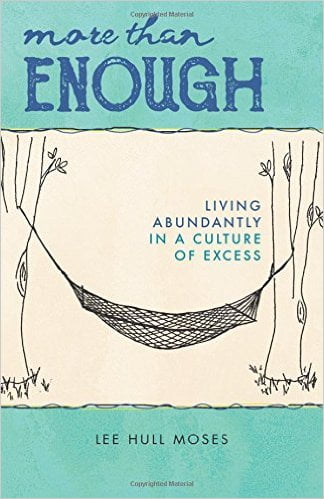 Abundantly in a Culture of Excess.
Abundantly in a Culture of Excess.
What I found in More Than Enough was a conversation partner in wrestling with privilege.
Lee Hull Moses gives us a context for responsible, thoughtful living: her home in Greensboro, NC. She's a wife, a mother and a pastor of a local church. Not that this is everyone's context, but there's a lot to gleam from watching a family being honest about theirs.
We see Lee want to grow her own food in her backyard for environmental reasons (and try!), but find that she's without a green thumb . . .
We see Lee see want to make responsible choices about banking, but struggle with time to actually transfer her accounts to a socially responsible credit union . .
We see Lee want to support those who make a living wage with fair labor practices, but then fight the urge of convenience when sleds for her children are on sale at the big box store . . .
What I most appreciated about the book: Lee's honesty.
Her careful attention to prose helped me be present to her circumstances throughout the book. She shows us a longing to live your values in her weekly shopping only to find that her children just want fast food chicken nuggets!
She shows the desire to advocate for moral causes only to find there's not enough time in the week to do the work she's actually paid to do.
She shows the practice of taking a fun vacation with her husband only to find guilt bubbling over about how the money could be better spend helping the poor.
It's real life. Struggles many of have faced.
So in the spirit of Lee's book, in this one post, I do not have the answers for how to wrestle with your privilege. Or mine. But I do have this advice.
Be honest about your privilege.
For those of who want to do good with our lives. For those of us who know better and want to do better as Maya Angelou would say . . . for those of us who know we could be serving our community in more thoughtful ways.
Start there.
Just say it.
I am a privileged person.
I am a privileged person who didn't make the time to vote.
Or I am a privileged person who bought cheap stuff this week I know came from unregulated factory in China.
Or I am a privileged person who did not recycle though I passed by a big blue recycle bin.
This honesty is not meant to make us feel bad. Or hide in corner feeling judged. No. It's meant to move us forward.
For if there is anything I gleamed from the book, More Than Enough, it is change comes when we try. We can all take baby steps.
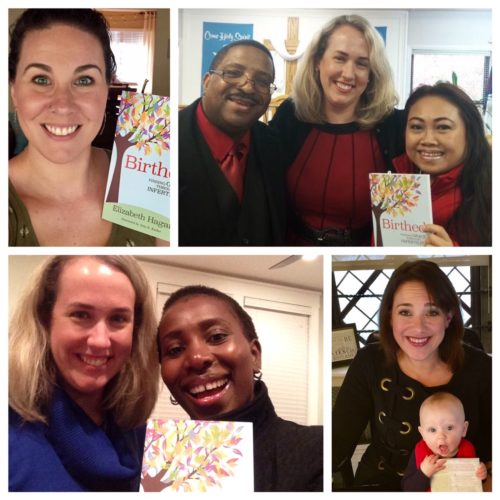 My book, Birthed: Finding Grace Through Infertility has been out for over a month now. It's hard to believe that so many of you have had the opportunity to read the words that I labored over for so long!
My book, Birthed: Finding Grace Through Infertility has been out for over a month now. It's hard to believe that so many of you have had the opportunity to read the words that I labored over for so long!
Do you have your copy yet?
It's been fun to read what others are saying and thinking about the story as they've shared their reviews, comments and even selfies with the book. If you've been thinking of buying it (or reading it if it's on your nightstand), here's three reasons recent reviewers who think you'll love it.
" Birthed isn’t your typical book. Rather than coddling the reader with niceties and pretty theological bows on top of life’s complex sufferings, Elizabeth invites us into the layered and difficult details of her story of infertility. I once heard Nadia Bolz-Weber say that it’s the “jagged edges of our humanity” that allow us to see God in each other, and this is exactly what Elizabeth does through her writing."
"I sat down to read Birthed: Finding Grace Through Infertility convinced I would have nothing in common with author Elizabeth Hagan. After all, both my children were conceived after three stress-less months of trying, practically on schedule. . . God’s grace, on the other hand, is something I’m infinitely familiar with (even though I often forget about it in the middle of my temper tantrums). And the way He likes to wrap it up with big red bows and drop it off as a big surprise is something that’s happened to me more than once. And that’s what this book is actually about — it’s about those little love notes from God that can set our lives on a completely different path than the one we’d imagined, the one we’d planned for, the one — dare I say it — we idolized."
"Elizabeth is telling the truth. . . . It is more than an attitude or an aspiration. It’s not enough to tell each other to try harder in prayer or sheer will, but true hope is more than the promise of something good. It isn’t always a song that we sing but might be more clearly understood by our protests. It’s a testimony I need to hear this year and so I’m adding Birthed to my [list]."
Have they inspired you? Before midnight today-- January 26th, Chalice Press is offering 30% off if you order it from their site with the code Dream17.
As always, feel free to ask a question or leave a comment. I'm glad to keep chatting on or offline with you!
It's summer and time that many of us start thinking about picking up a good book for a Saturdays at the pool or to dive into over vacations. If this is you, here are 4 thought-provoking non-fiction picks I would add to your list . . . books that might make you think about racism, sexual violence, disabilities or fundamentalism differently.
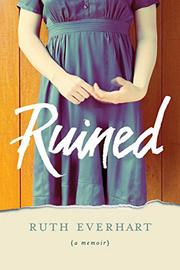 Pre-order now. Will be released on August 2nd. Ruth is a friend of mine from the RevWriting group I participated in from 2012-2015. During that time, I watched Ruth develop, write, and re-write this memoir about her experience of being sexually assaulted while a student at Calvin College and all that came next.
Pre-order now. Will be released on August 2nd. Ruth is a friend of mine from the RevWriting group I participated in from 2012-2015. During that time, I watched Ruth develop, write, and re-write this memoir about her experience of being sexually assaulted while a student at Calvin College and all that came next.
In Ruined, Ruth does not shy away from the hard places of theological shaming, rape, grief and messy vocational callings. From the first chapters I read of this project, I knew Ruth was the real deal. Her command and fluidity of language drew me into her story from the start. Her courage to share her story with such vulnerability pushed me to tell my own. Her willingness to explore theological hard places keep me thinking long after I put her book down. Ruth's story is a one that the church needs because it doesn't shy away from the hard places of life. She tells the truth!
2. Just Mercy: A Story of Justice and Redemption by Bryan Stevenson
Our world needs more angels like Bryan Stevenson and more stories like this one! I literally could not put it down when I started 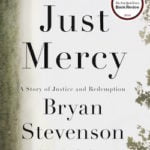 reading it back in April. It was one of those reads where I felt convicted on every page on how much I didn't know that I thought I did about our prison/ justice system in America.
reading it back in April. It was one of those reads where I felt convicted on every page on how much I didn't know that I thought I did about our prison/ justice system in America.
In Just Mercy, we gain a front row of Bryan Stevenson's journey from 23-year-old Harvard Law student encountering prejudge in the criminal system for the first time in the deep south to founder of the Equal Justice Initiative based in Alabama with far reach. This author writes with such clarity and trustworthiness as a narrator that you are just hanging on every word to see what comes of his vast collection of clients. Of special interest is the case of Walter McMillian, a convicted murder on death row-- who we learn is innocent. But the question is will he be released from prison? Though I've heard stories like this for years by colleagues in prison ministry, Just Mercy did something to me. With a softened heart to the cause, I'm ready to act.
3. Unorthodox: the Scandalous Rejection of my Hasidic Roots by Deborah Feldman.
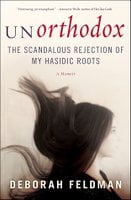 Growing up in a sheltered Christian home, I thought my type of Christians were the only weird ones. But, it isn't true, of course. Fundamentalists are found in every religious tradition. A friend recently introduced me to this memoir of Deborah Feldman saying Unorthodox "is like Jewish version of your life."
Growing up in a sheltered Christian home, I thought my type of Christians were the only weird ones. But, it isn't true, of course. Fundamentalists are found in every religious tradition. A friend recently introduced me to this memoir of Deborah Feldman saying Unorthodox "is like Jewish version of your life."
I was delightfully surprised at what an all-encompassing view Unorthodox gave of what it is really like to grow up as a Hasidic Jew in New York City. We follow her from the days of her bewildering childhood, being raised by her grandparents as a child of a mother who ran away and a father without the mental capacity for child rearing. As much as this author tries to fit in and be a "good girl," one her (especially religious grandfather will approve of) slowly we see her transformation. We see the joy that comes to her from sneaking library books under her mattress. We see the joy that comes as she thinks independently. We see the joy that comes as she makes friends in high school who are also experimenting with the outside world like her. It's quite a journey, this book.
4. Before and After Zachariah by Fern Kupfer
This book might be harder to find in print (written in the 1980s) but it's worth the search if you can find it! The vivid language and emotionally driven plot captivates the heart about of a family's struggle to make peace with the son given to them-- a gift they would have not chosen. This memoir plays out in a quiet Midwestern town through the voice of Fern, the mom, and describes for readers the ups and downs of what it means to birth, raise and make decisions for the care of a severely mentally and physically challenged child. Questions of "When it is it time to institutionalize?" Or "How does a marriage survive such kind of care for another?" Or even "How do you parent a 'normal' child while taking care of such a 'abnormal' one too?" are raised in ways that the reader does not often expect. I was challenged to reconsider how I think about and care for parents and teachers I know who are caring for special needs children.
What are you reading this summer?
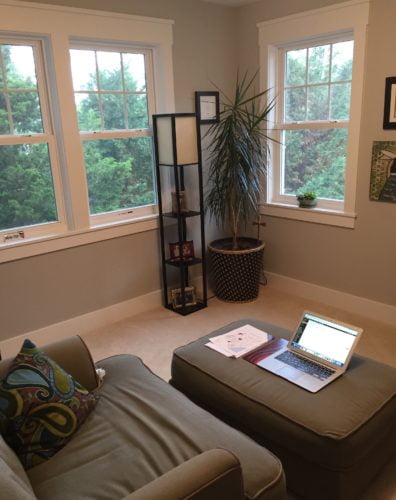 What am I up to these days? Writing, writing and more writing!
What am I up to these days? Writing, writing and more writing!
My publication date of this memoir project is only months away now. And we have title! Watch for Birthed: Finding Grace Through Infertility coming October 2016! The planning stage for marketing is in full force now, and it's excited to see the years of working on this coming together.
And just like parents who've birthed their first child, people are already asking me what about another? Am I going to write a second book?
And the answer is YES! (I hope).
I've got an idea brewing in me related to orphan care and already some fire in me that's got me drafting like crazy these past couple of weeks.
Being at the starting gate again is frightening (like I've never written a word in my life), comforting (like hey I did this once and survived so maybe I could do it again) and equally annoying (like oh, my goodness I'm going to go through this LONG writing and re-writing process over and over. What am I thinking?).
Thanks to a wonderful workshop sponsored by the great folks at Collegeville Institute and Austin Presbyterian Seminary that I attended a couple of weeks ago, my drafting of late has come with these questions on my mind.
But, most of all I think a lot about what makes writing good?
Like most writers, I always have the fear in the back of my head that says, "What if I am not good enough at this? What if what I put together flops? (Especially since I have no idea if you liked the first book yet . . . )"
In my fears, though, I know I'm not alone. Because the more I have conversations with those of you who are considering writing for the first time, you tell me: "Who am I to think that anything of my life would be interesting to someone else?"
I want to say this because I believe we as artists (musicians, painters, dancers, gardeners, etc.) waste so much time that we could spend producing JUDGING ourselves. And in this, the world misses out on the best contributions we might have to offer. (A great book by Elizabeth Gilbert has a lot to say about this which I highly recommend).
The more I sit with the question of makes writing good (or any creative offering for that matter) my opinion is this: good writing tells the truth. Good writing offers a piece of our common story of being on planet earth as a human being that we all can relate to.
Sure, in the writing world, grammar and proper use of metaphors within a chapter are important but "good writing" is not all about technical details, I told a young friend recently.
I read a lot. And I can usually tell pretty quickly if I am going to stick with a book or discard it from the pile of books on my nightstand or in my Kindle. For I'm easily annoyed by writers who try to sound like someone else. Or are so full of ego or lost in fantasy that they don't admit what is really troubling them.
You see, the thing is like you, I love stories. I love stories that make me feel less alone. I love wise stories that speak wisdom on the page that I'm not ready to say aloud, but want to. I love stories that give me new insight into those I think I hate, and stories that leave me convicted about how little I know.
This is why I have the words BE BRAVE on the home screen of my computer. I look at them every day.
So what is it like writing a memoir? It's growing comfortable telling the truth-- the best you can.
